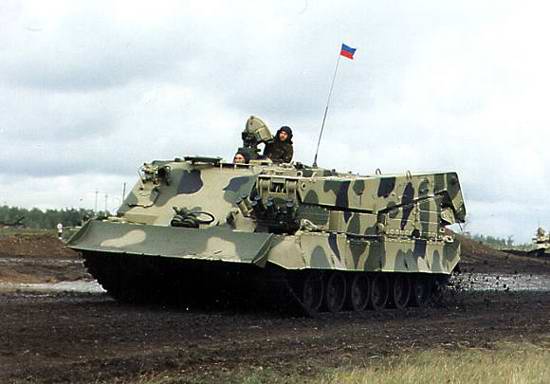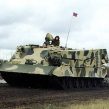
Russia’s “New Look” Contract NCOs
Publication: Eurasia Daily Monitor Volume: 9 Issue: 76
By:

Moscow plans to introduce a new training program for military professionals in early May, which envisages intensive six week courses for contract personnel. The latest in an endless series of experiments aimed at improving standards among kontraktniki is also intended to reverse the long standing degeneration of standards and discipline in the non-commissioned officer (NCO) cadre. Elements of the new training courses certainly reveal a level of determination on the part of the defense ministry leadership to address these issues, and seem to be predicated on raising the training threshold to match the training of Spetsnaz troops (Rossiyskiya Gazeta, April 10).
The initial six week training for new kontraktniki involves a number of stringent tests in order to acclimatize soldiers to heavier physical and psychological load bearing. During the field training element, the soldiers are exposed to various survival tests, including hiding from enemy forces following an advance by armored personnel carriers, running through a fire-assault zone, and being exposed to a simulation tent full of poison gas. Contract personnel will be expected to complete a 50-kilometer (km) march on foot and a 10-km run in full kit, while officers will also undergo such tests in order to promote fitness and unit cohesion. The courses are designed to avoid the contract soldier being “shocked” by real combat operations and to encourage the kontraktniki to perform their duty in any situation or terrain. During the past two years, the Defense Ministry has formed nine separate training programs for various service categories, all aimed at introducing a more differentiated system of military training (Rossiyskiya Gazeta, April 10).
Such initiatives related to improving the standards among contract personnel and NCOs, are consistent with the Defense Ministry’s longer term plan to increase the number of kontraktniki serving in the armed forces to 425,000 by 2016. As part of achieving this final target, the military must recruit 50,000 kontraktniki annually. However, it is also apparent that the new courses are calibrated to avoid simply encouraging a variation on conscript service, marking an effort to genuinely raise standards. The priority posts for the new kontraktniki will be NCO positions, as well as specialist roles that in the Russian military system are involved in the determination of combat readiness (reflecting the fact that conscripts are excluded from the measurement), and these will appear first in the South Military District (MD) (Interfax, November 26, 2011).
According to officers serving in the 41st Combined-Arms Army in the Central MD, the decision to reinstate officer ranks in crew chief posts was taken by the General Staff in November 2011 as a result of reflecting on the lessons drawn from the operational-strategic exercise Tsentr 2011, held two months earlier. Indeed, the officers responsible for training conscript NCOs in only a two month period reported that it was simply impossible to impart any more than the very basics of service. Officers estimated that to train conscript NCOs properly for service in a battery would take at least three years; hence the General Staff concluded not only that temporary solutions were required, but also pressed the Defense Ministry to prioritize contract NCO posts in the future (Krasnaya Zvezda, April 4).
Krasnaya Zvezda recently profiled some of the problems involved in training NCOs, in which one company commander in the Central MD suggested that the defense ministry should return to what he characterized as the best traditions of the Russian Imperial Army and the Red Army, by training conscript NCOs from among the highest quality soldiers, and not from new recruits. The flaw in the selection system leaves the military denuded of NCOs with proper leadership and command skills. Moreover, training centers are currently isolated from the units. This undermines the level of training, with soldiers reportedly unable to shoot well, load ammunition or load the gun on a BMP-2 (armored personnel carrier). Some officers suggest that a solution may lie in subordinating the training centers to officers serving in the units, making officers and NCOs responsible for raising the overall training standards of their units (Krasnaya Zvezda, April 4).
Major Pavel Gaus graduated from the Novosibirsk Combined-Arms College in 2003 and noted what he saw on arrival in the unit: “I saw with my own eyes what a big difference in commanding-officer training there was between our former NCOs and rank-and-file students. Because of a lack of practice as a commanding officer, the latter, on becoming lieutenants, demonstrate an elementary inability to give orders and even instill fear in a soldier. During their brief student work experience among the troops, future officers simply do not have time to acquire the necessary command skills” (Krasnaya Zvezda, April 4). Until proper professional NCOs are introduced in the units, lieutenants will be under increasing pressure to improve their leadership and command skills.
Four years into the “new look” reform, junior command remains weak, the training system to address this is being revised, while the officer corps is largely unreformed and insufficient numbers of adequately trained kontraktniki serve in the Armed Forces. Rectifying the lack of command skills at various levels of the officer corps and NCO cadre is a central theme in the reform. However, overhauling the old training system, devising replacement course structures and steadily raising standards is proving to be more problematic than first envisaged. Not only does the “new” system run aground on the issue of conscripts serving for only twelve months, but the continuity of certain approaches to training such as the failure to unify training centers with the units further complicates these difficult tasks. If contract personnel and NCOs are to achieve higher standards in the long term, their selection system itself must fundamentally change.




